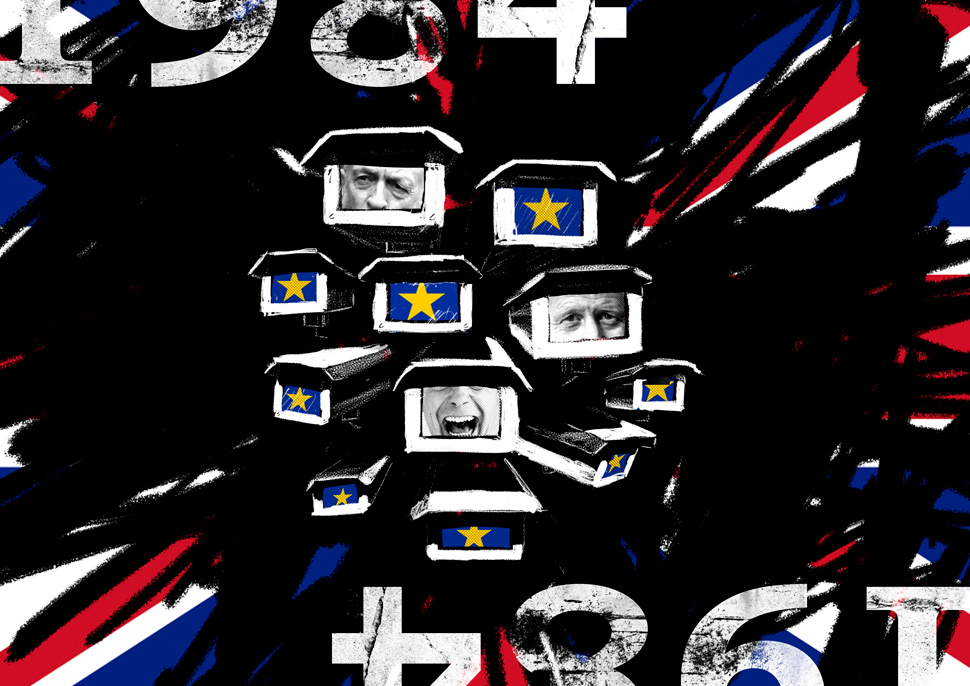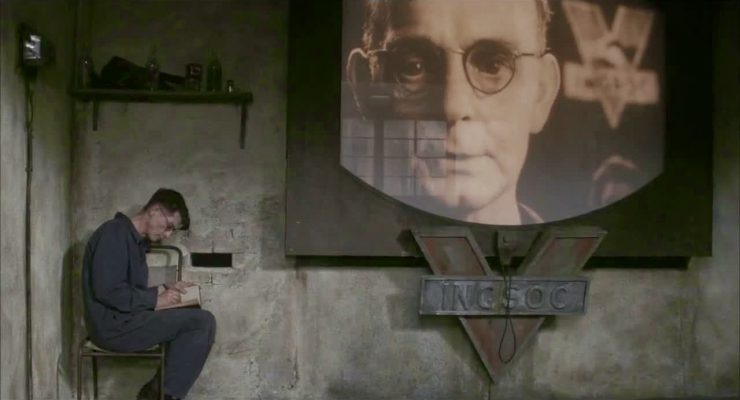- Home |
- Search Results |
- How Nineteen Eighty-Four warned us about Brexit
How Nineteen Eighty-Four warned us about Brexit
Seventy years after it was first published, Chris Deerin argues, Orwell’s masterpiece remains as prescient as ever, foreshadowing everything from fake news to AI anxiety to 'Big Boris'.

“We didn’t ought to ‘ave trusted ‘em. I said so, Ma, didn’t I? That’s what come of trusting ‘em. I said so all along. We didn’t ought to ‘ave trusted the buggers.”
Imagine George Orwell had written a book called “2024”. Imagine in those pages he described a Britain that, affronted by the impositions of self-important Belgians and the diktats of uppity Luxembourgers, wooed by honeyed, homespun promises of plenty and sweet murmurings about “freedom” and “sovereignty”, had lifted its skirts and stormed from the chambers of Europe.
Then consider Orwell’s matchless, clarifying mind tweezering apart the consequences of such a decision – a bad decision, it would turn out, driven by the desiccated yet frenzied tabloidisation of political debate, the superiority-spasm and sense of imperial exceptionalism that have always lain buried like ticks under John Bull’s skin, and the deliberate exploitation of such by the usual combination of ideological fanatics and amoral spivs with their eyes on the prize - Big Boris, if you will.
Again and again across his work, we find Orwell got there first, saw the field more clearly, captured the game more perfectly. His grasp of human motivation and its complexities, of the political structures on which the affairs of humankind rest and the gales that ceaselessly buffet them, remains peerless. Augie March said it of Trotsky: as the rest of us crawl from one clam-rake to the next it is stirring to have a glimpse of deep-water greatness.

Nineteen Eighty-Four is a handbook from history, one that chimes with the times, all of the time
70 years on from its publication, Nineteen Eighty-Four, or "1984", continues to stand as Orwell’s superlative achievement. It is not his finest novel – I would rank Keep the Aspidistra Flying and Coming Up For Air higher – but it is an, if not the, urtext for political analysts, an intellectual and humanitarian masterpiece delivered in perfect prose. It is a handbook from history, one that chimes with the times, all the time: in case of emergency, break glass.
“We didn’t ought to have trusted the buggers” is uttered by a tearful, gin-soaked pensioner seeking safety in the bowels of a tube station from the bombs dropping above. “Perhaps it was the time when the atomic bomb had fallen on Colchester… which buggers they didn’t ought to have trusted Winston could not now remember.” Such is politics: one untrustworthy bugger after another, fading back beyond the horizon of memory. The scale and scenarios may differ – a nuclear stand-off, a trade war, a constitutional implosion, a leadership contest – but the types and the tricks and the tics are always familiar; the will to power, the self-justifying marshalling of fact and argument, the manipulation of the herd, always tragically visible.

The state as Big Brother may not be the immediate cause of concern in the West – the jitterings of America’s shack-dwelling unabombers and the more deluded stripe of Europhobe aside – but we are living through an era in which the threat of being under constant surveillance, of privacy-depletion, is very much extant. There is always art that subliminally reflects the moment – the Strangelovian nuclear terror of the Cold War, the run of noughties movies in which a revengeful climate wiped out the planet, the starred ‘n’ striped superheroes that save us from malign aliens, whether they be a metaphor for Islamists or Chinese totalitarians.

Big Brother’s omnipresent telescreens capture the paranoia that sees us taking down our Facebook accounts
In the present moment, it is the unknowable trajectory of AI that is directing traffic – in recent months I’ve read a clutch of excellent new novels addressing technology and the tightening grip of its tentacles, including Sam Byers’ Perfidious Albion (also a post-Brexit fable), The Plume by Will Wyles, Oliver Harris’s A Shadow Intelligence, and Ian McEwan’s Machines Like Me. There are many, many more – if you listen hard enough you can hear the high hum of authorial fretting about intrusion, disruption, replacement.
Orwell was already there, of course, in 1949. Big Brother’s omnipresent telescreens and hidden microphones capture the paranoia that today sees us taking down our Facebook accounts, taping over the camera aperture on our laptop, flinching at personalised adverts blatantly based on our online activity. Algorithms are giving us the yips.
What is the Ministry of Lies but fake news, being weaponised daily by the world’s most powerful man and his media cheerleaders? “Two and two make five”, Winston Smith finally accepts. “What are the stars?’ asks O’Brien. “They are bits of fire a few kilometres away. We could reach them if we wanted to. Or we could blot them out. The earth is the centre of the universe. The sun and the stars go round it.” The crowd at Donald Trump’s inauguration was the biggest in history. Mexico is going to pay for the wall. Brexit means Brexit. No deal is better than a bad deal.
What is objective knowledge? Next up, fake video, where even the evidence of our eyes can no longer be trusted.
What are the rhetoric of Nigel Farage and Ukip and Tommy Robinson, what is the purpose of that ‘Breaking Point’ poster, but calls to Two Minutes Hate, the Othering of others. “Swine! Swine! Swine!” screams Julia at the image of Emmanuel Goldstein, a familiar 2019 sentiment towards a familiar 2019 target.
“The best books…”, Winston perceived, “are those that tell you what you know already.” 1984 tells us what we know already, but too often forget. It rings and clangs and jangles with alarums down through the decades, ever perceptive, ever relevant, ever jolting, ever on our side.
This year George Orwell's Nineteen Eighty-Four celebrates its 70th anniversary. Read an excerpt from the bestselling classic novel here.